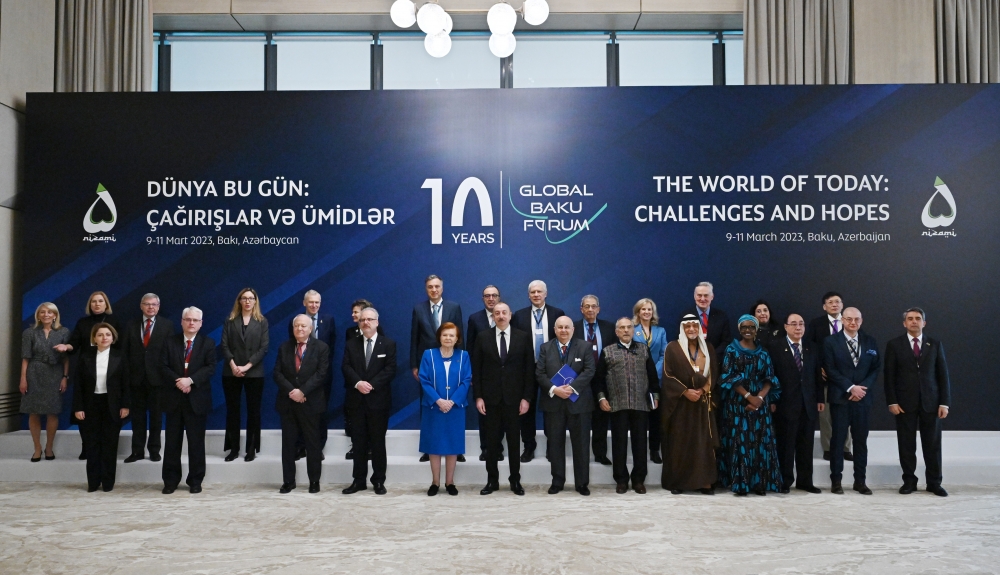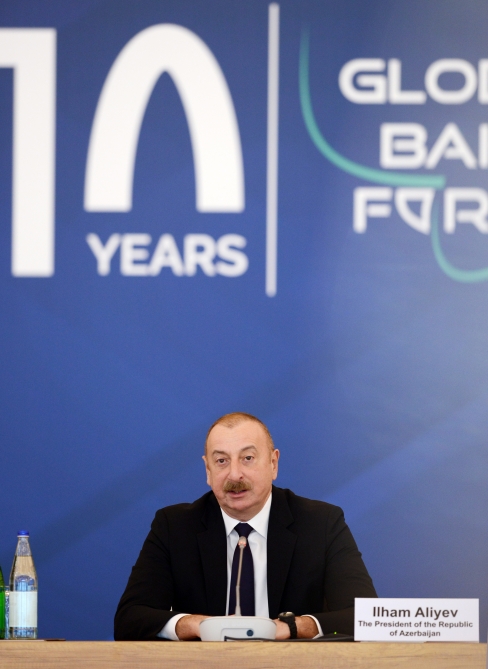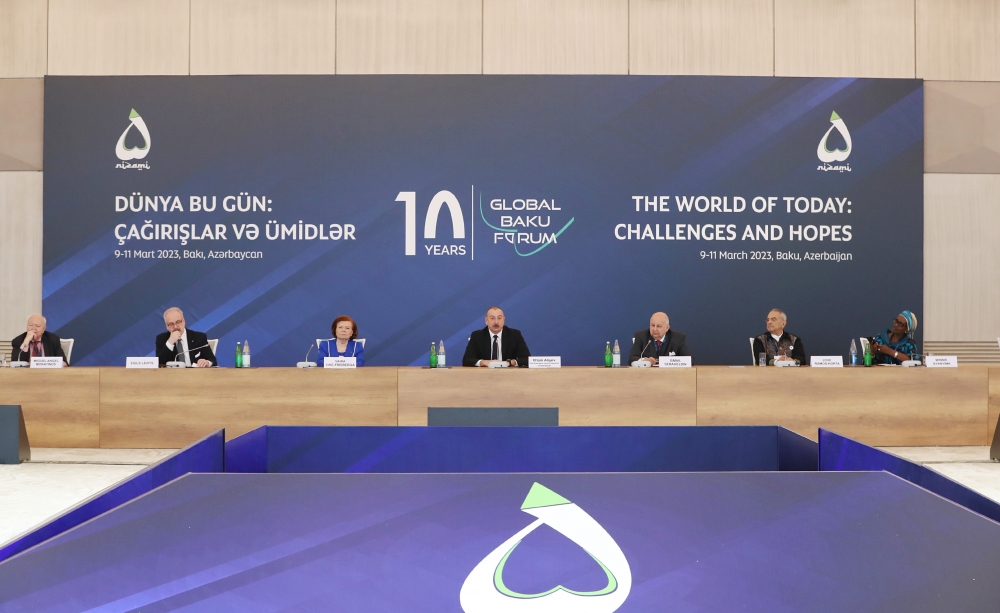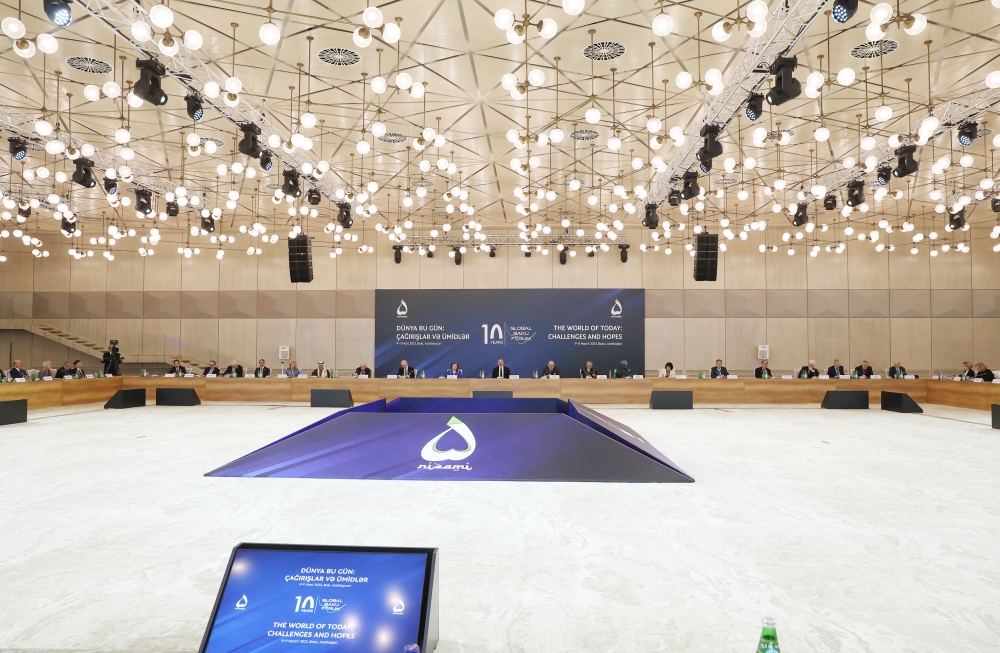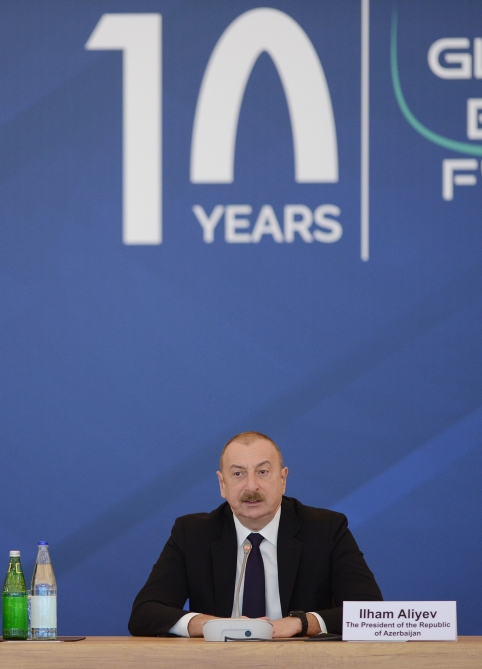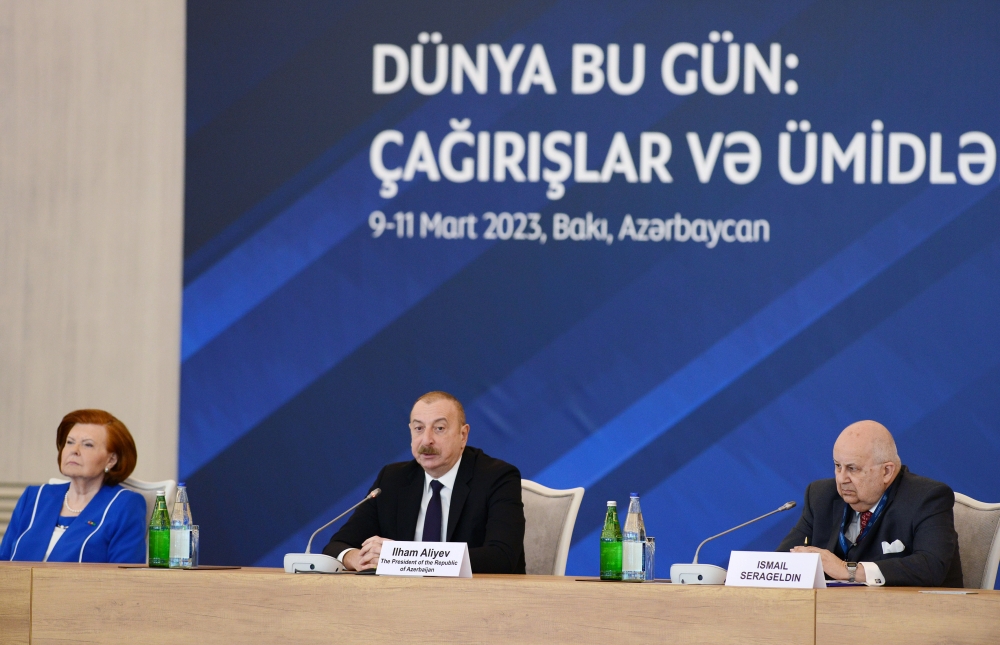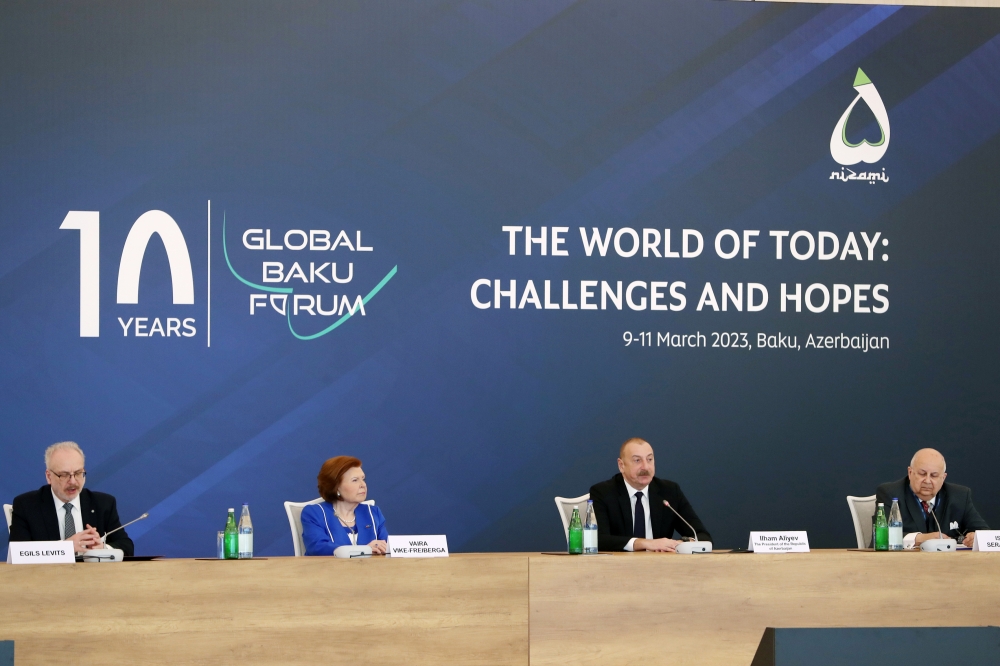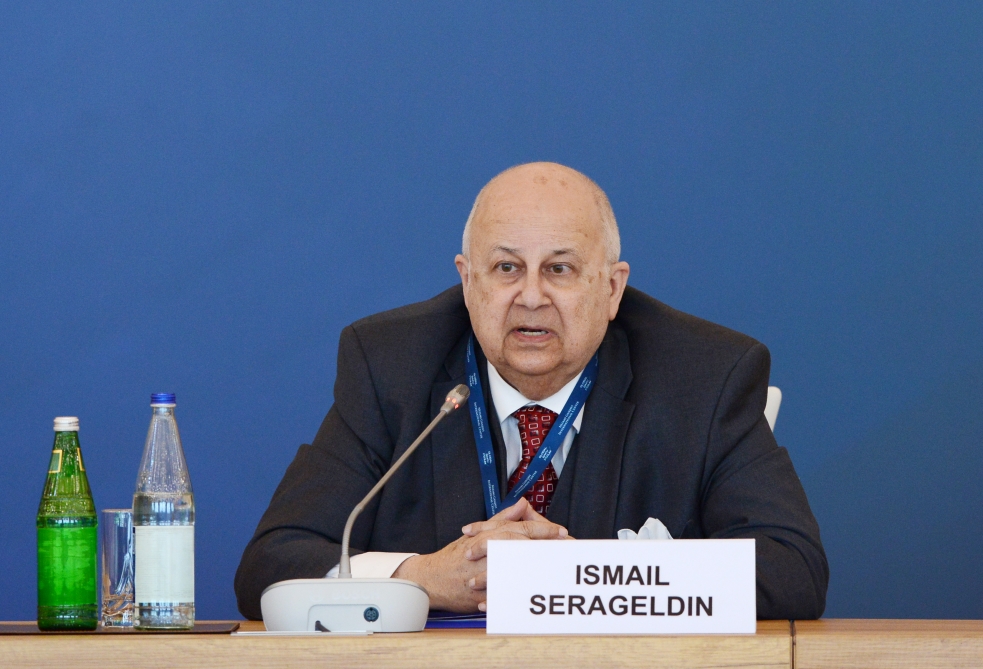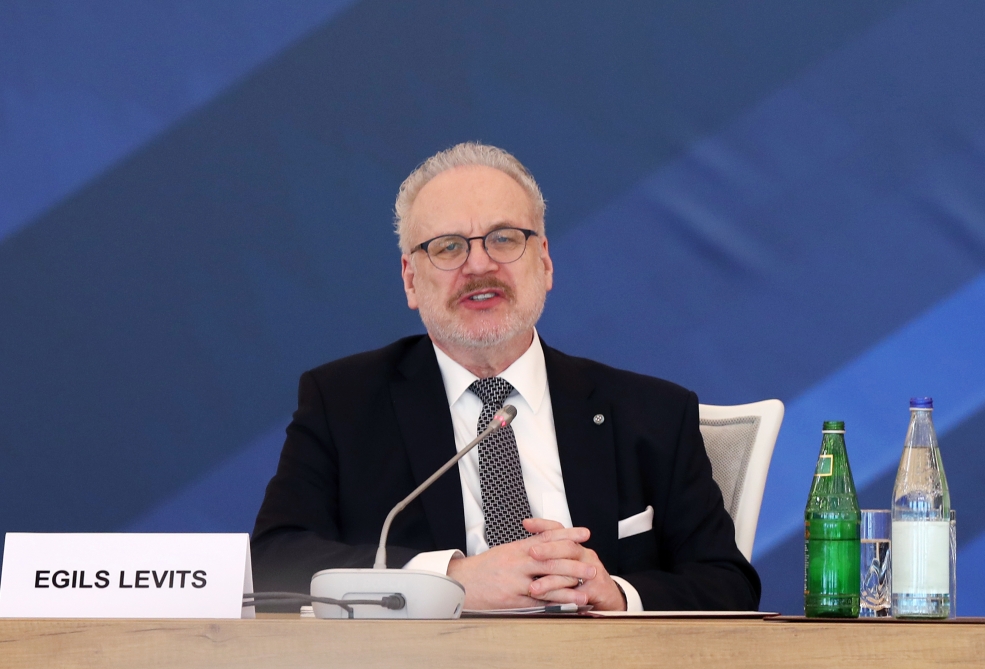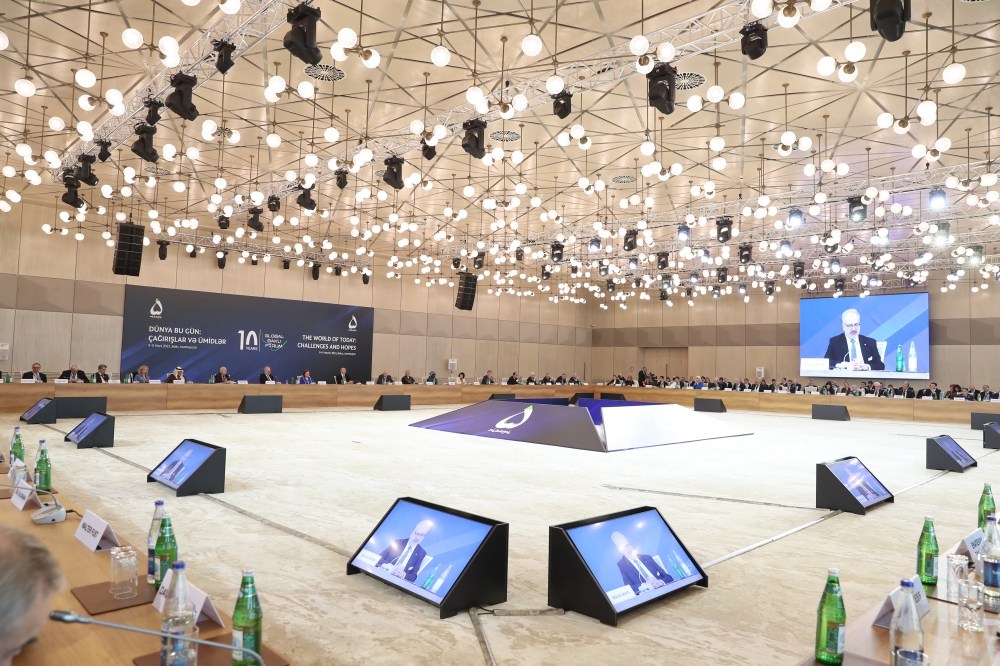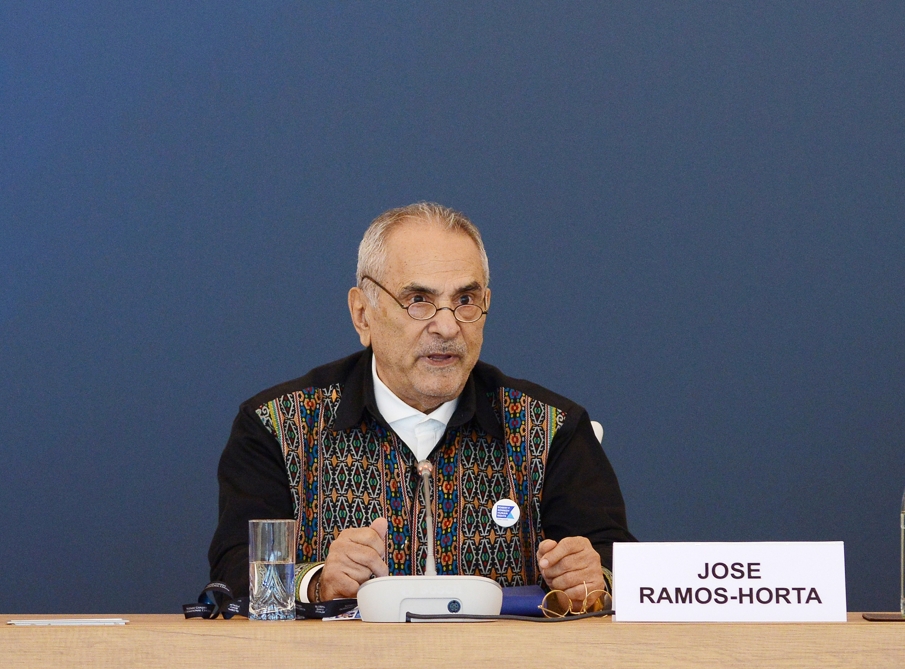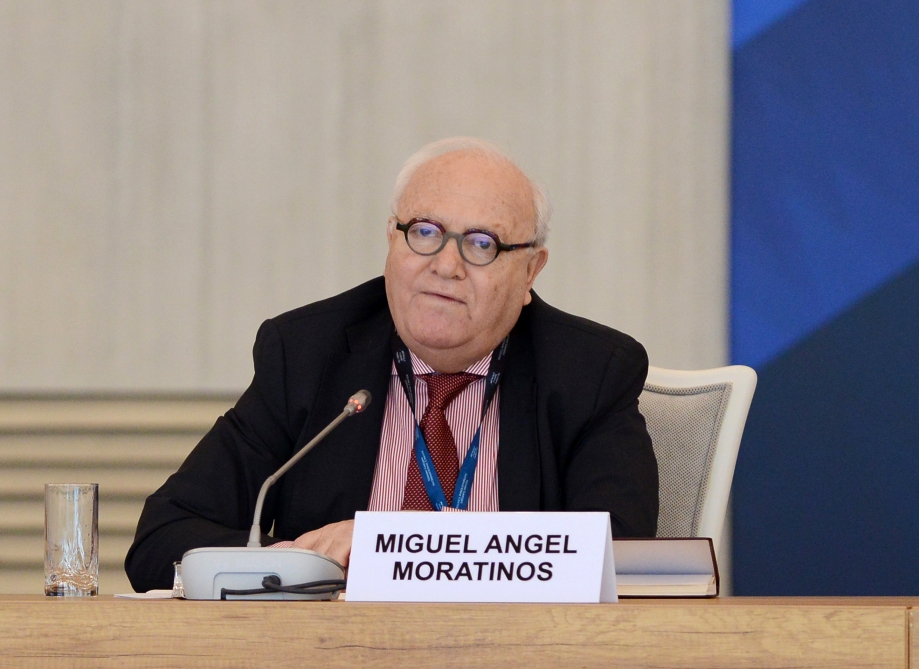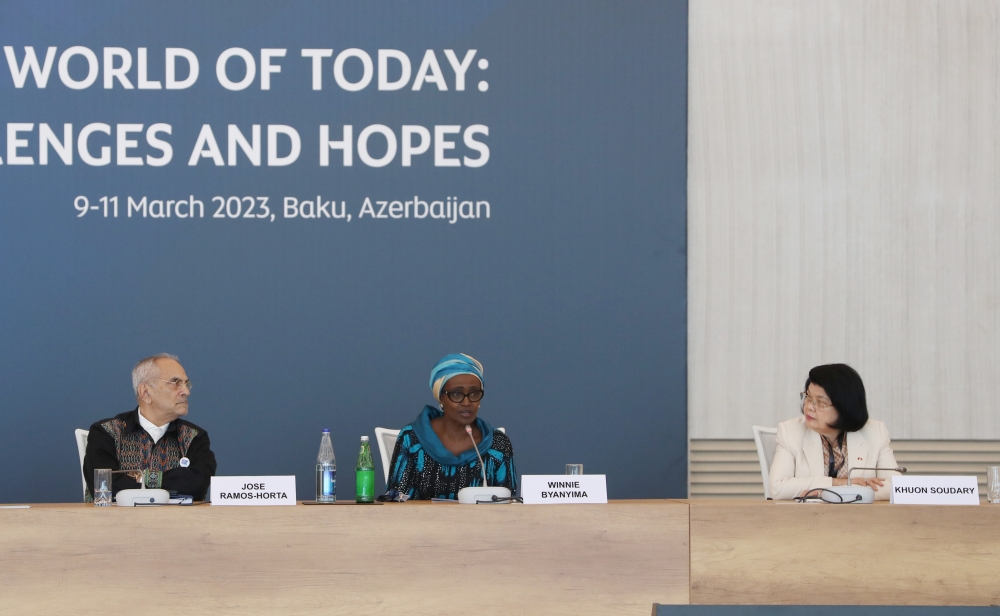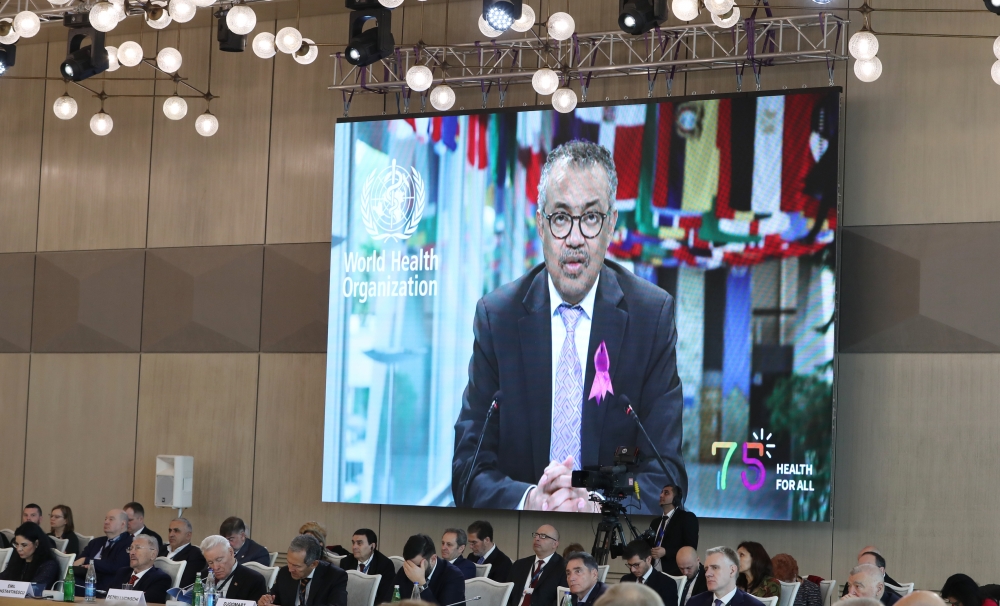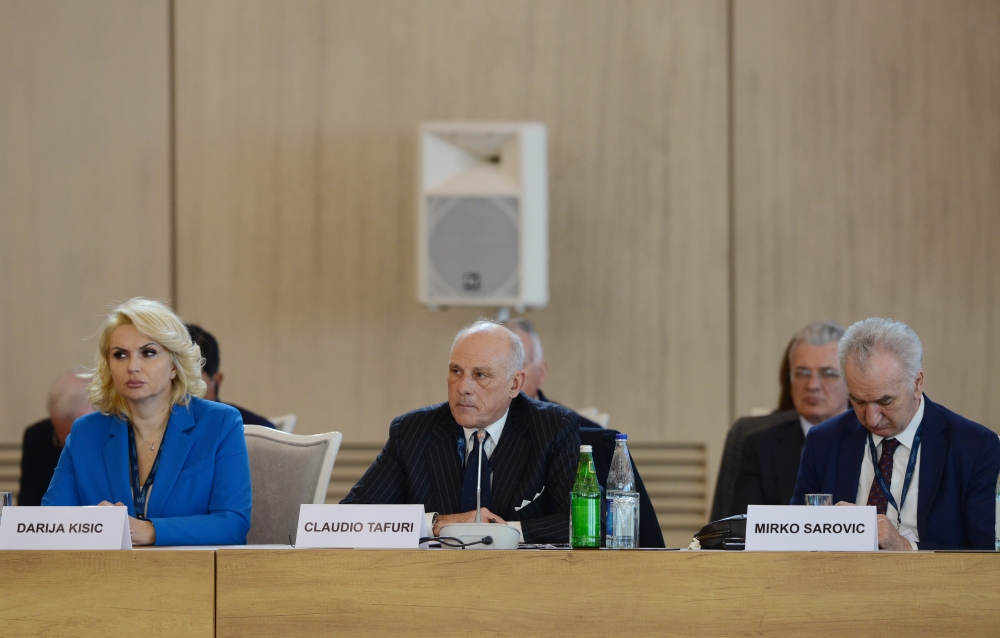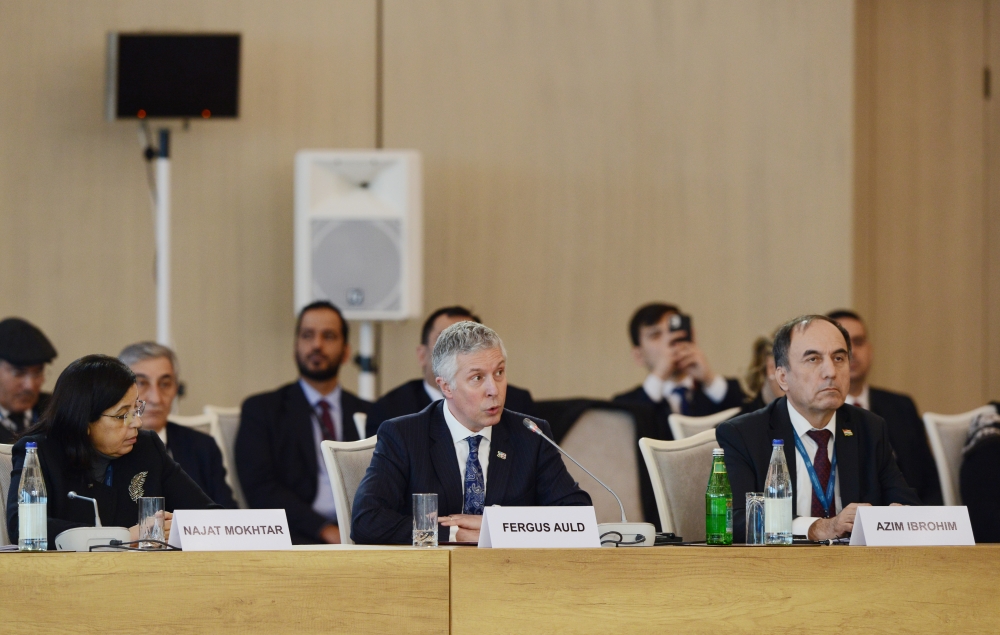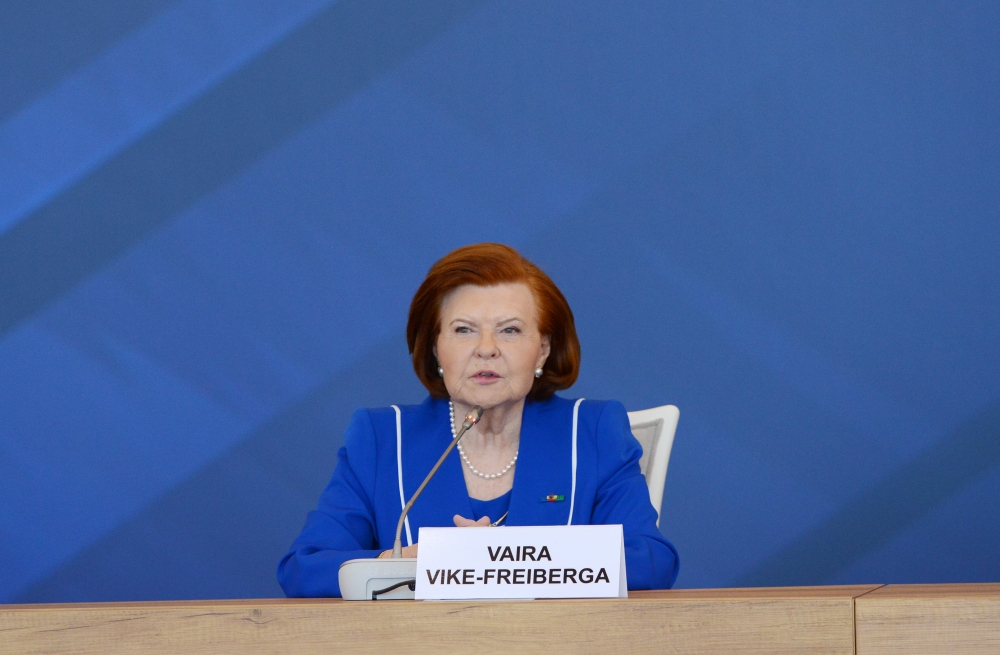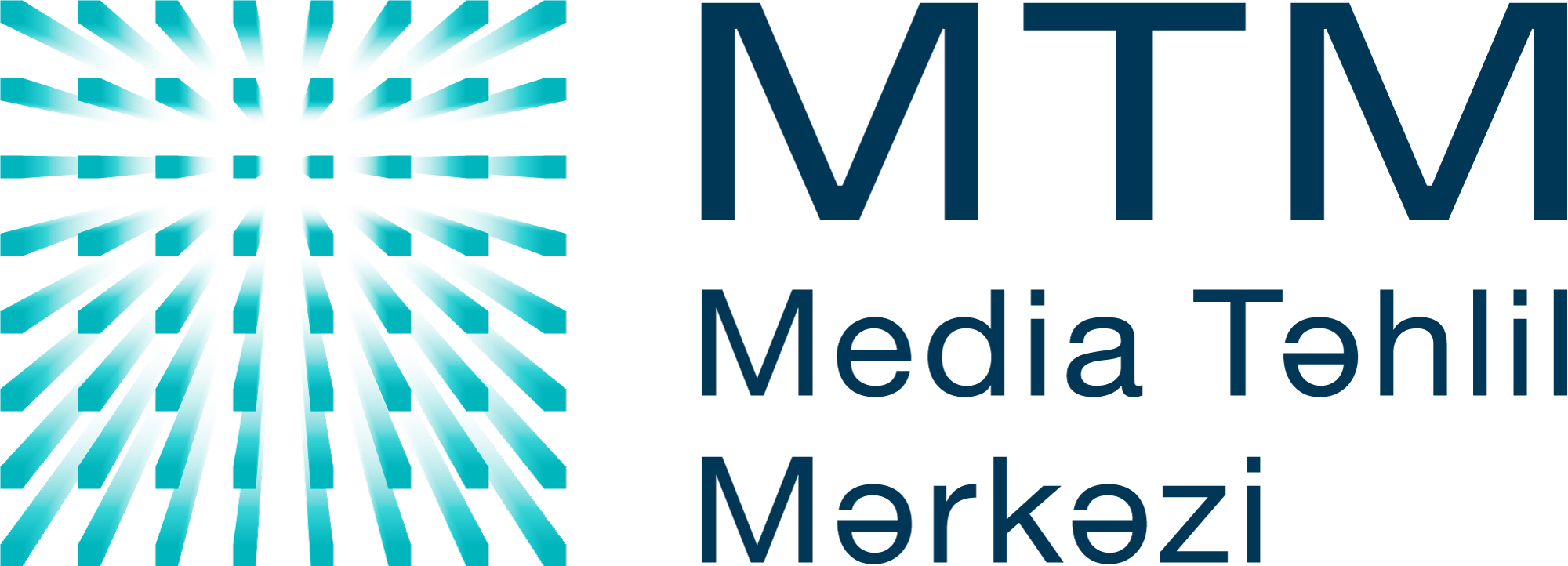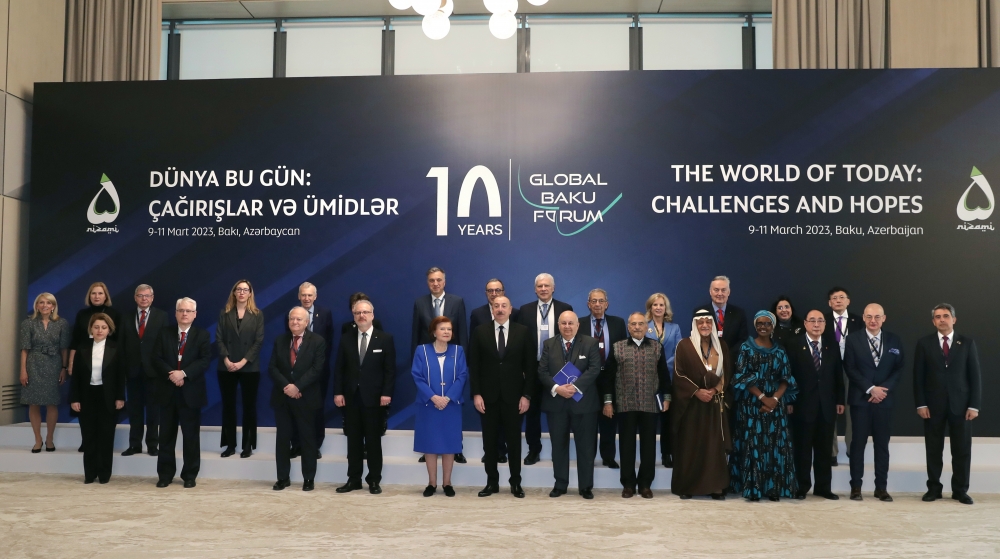
Organized by the Nizami Ganjavi International Center under the patronage of President of the Republic of Azerbaijan Ilham Aliyev, the 10th Global Baku Forum themed “The World of Today: Challenges and Hopes” has today kicked off.
President Ilham Aliyev attended the opening ceremony of the Forum.
First a family photo was taken.
Opening the 10th Global Baku Forum, co-chair of the Nizami Ganjavi International Center Ismail Serageldin said:
– Good morning, Your Excellency.
Ladies and gentlemen.
It is with great honor that I announce the opening of the Global Baku Forum as a co-chair on behalf of the Nizami Ganjavi International Center.
We are living in a difficult time. Today we see that wars are intensifying, and different policies and political solutions are necessary. Therefore, it is necessary for people to come together, for communities to participate in this work, and in fact, the lessons learned from history should be revisited. We must work and fight for universal goals, crossing the lines that separate each other, regardless of ethnic, racial and other aspects. Because we all share this opinion. As you know, the UN adopted the Millennium Development Goals in 2000 and the Sustainable Development Goals in 2015, defining a common agenda for all of us, for all of humanity.
Now we have common challenges before us. We know that millions of people lost their lives during the pandemic. Today, in addition to climate change, water scarcity and food security are becoming more pressing. We see how many people are suffering from famine in the world today. Solutions to such challenges must be found.
Speaking about the purpose of the Global Baku Forum, Ismail Serageldin said: We must think about how we must create new hopes and look to the future – tomorrow. Walking along this path, we need to know what are wrong and right steps and how to move forward in a more resilient way. It is with such hope that we have gathered here.
It is with great pleasure that I would like to give the floor to you, Your Excellency Mr. President.
x x x
The head of state addressed the opening ceremony of the Forum.
Speech by President Ilham Aliyev
– Good morning, ladies and gentlemen.
Excellences.
Dear guests.
I welcome you all in Baku. Thank you for participating in the 10th Global Baku Forum. First of all, I would like to congratulate the members of the Board of the Nizami Ganjavi International Center for their achievements. Especially, I want to express gratitude to the co-chairs of NGIC, Madame Vike-Freiberga and Mr. Serageldin, for the leadership and for the contribution to development of NGIS and for outstanding achievements with respect to transformation of the Global Baku Forum into one of the leading international forums globally. This year, I participated in Davos World Economic Forum in January, Munich Security Conference in February, and now here in March in the Global Baku Forum.
And just I can say that the level of participants, the intellectual potential of Global Baku Forum is in line with the leading international conferences. And of course, this is a reflection of very thoughtful and productive activity of the co-chairs and the whole Board. We have more than 350 participants from more than 60 countries, and among them 50 acting and former presidents, and prime ministers. So, we can imagine that the level of discussions will be very high. And of course, the most important recommendations about the new approaches to international affairs will be most valuable. I looked at the program of the forum. As usually, it is very comprehensive. It covers issues related to the regions – Middle East, Africa, Western Balkans. At the same time issues, which today are on top of international agenda and the subject of discussions.
I also want to express gratitude to the Nizami Ganjavi International Center for the great respect to the memory and legacy of the great Azerbaijani poet Nizami Ganjavi, whose name the center carries. Nizami Ganjavi was born, lived, died and was buried in his native city of Ganja, one of the ancient cities of Azerbaijan. His wisdom and talent symbolize the wisdom and talent of the people of Azerbaijan.
I want to share my views and some information with respect to some of the topics of the discussions, which you will have. I was very happy to see one panel on multilateralism, especially taking into account that Azerbaijan this year completes its chairmanship in Non-Aligned Movement, which started in 2019 and was extended by unanimous decision of 120 member states for one more year until the end of 2023. We tried to, if I may use this word, to revitalize the Non-Aligned Movement, which had great traditions, but unfortunately during some period of time was a little bit passive. And for that, we organized international events, three summits. We initiated a Special Session of the UN General Assembly on COVID. We worked hard and created a database with respect to fight against pandemic, which was lately used by the World Health Organization. We dedicated one of the summits to fight against pandemic. We were very vocal against the vaccine nationalism and unequal distribution of vaccines in the first months of the pandemic. We address the issue of post-COVID development. In the meantime, we provided financial and humanitarian assistance to more than 80 countries, most of them members of Non-Aligned Movement. We provided 10 million US dollars direct donations to the World Health Organization to help them to fight the coronavirus.
At the same time, we tried to institutionally develop the Non-Aligned Movement. For that purpose, based on our initiative for the first time ever – in more than 60 years of the history of the Non-Aligned Movement – the Parliamentary Network was created. An inaugural meeting took place in Baku, and also Youth Network was created and the Secretariat for Youth Network also is based in Baku. We will continue our efforts, even after our chairmanship comes to an end by the end of this year. Because, we see that there is a big need for such a Movement in today’s world, in today’s divided world.
When we see, maybe the most serious confrontation between the East and West since the end of the Cold War. The Non-Aligned Movement can play and should play important role in building bridges, in creating new approaches to resolution of conflicts and, of course, the basic principles of Non-Aligned Movement – so called Bandung Principles. They advocate for peace, cooperation, respect to territorial integrity, sovereignty and inviolability of borders.
With respect to the conflict resolution, of course, it will be broadly discussed based on the program of the Forum. I can share our experience. Conflict resolutions have two ways – peaceful and not peaceful. We were trying hard to resolve the conflict with Armenia by peaceful means, despite the fact that Armenian occupation created a humanitarian crisis in Azerbaijan. As a result of Armenian occupation, more than 1 million Azerbaijanis became homeless, became refugees and IDPs.
Armenia conducted the policy of ethnic cleansing against Azerbaijanis and expelled them from Karabakh and created sufferings for a million Azerbaijanis. Despite our attempts to resolve it peacefully, and to persuade Armenia to comply with the UN Security Council resolutions, which demanded immediate, complete, unconditional withdrawal of Armenian troops from Azerbaijani territories, Armenia just ignored the UN Security Council resolutions and demonstrated disrespect to international law and international community. In 1992, just after the conflict started, the OSCE created Minsk Group. But, unfortunately for 28 years, Minsk Group did not present any results, did not produce any result. And it seemed to us in the end of the negotiation process that they just wanted to freeze the situation. They wanted to make this conflict frozen forever. But, we did not agree with that. We did what we considered right to do, using our right for self-defense, the UN Charter, particularly Article 51. We liberated our territories by force. This was our legitimate right.
So, we tried to do it peacefully. We failed, because there was no constructive approach from the Armenian side. And we did it by force and we liberated our territory. And now for almost two and a half years, we are rebuilding the huge territory of 10,000 square kilometers, which is totally devastated. And by the way, the representatives of NGIC visited Shusha and had a discussion, panel discussion in Shusha. They’ve seen the destruction in Fuzuli, in Shusha, and it’s really the sign of barbarism, it is urbicide, culturicide, ecocide. And that was done by our neighbors. The people of Azerbaijan have a moral right to demand revenge, and I can understand it. But my message is that we took revenge on the battlefield.
We did not commit any war crimes, unlike Armenians. We did not commit genocide, unlike Armenians did to us. We took revenge on the battlefield. So, now it’s time for peace. Therefore, right after the war ended in November 2020, we launched an initiative to start peaceful negotiations and presented the famous five principles, which could be a basis for peace agreement with Armenia. We hope that international actors, which try to facilitate will persuade Armenia not to lose this chance. They lost the chance to become an independent country. They become totally dependent, kind of a colony of other country, and now maybe other countries. So, they lost their chance to become really independent and to build their future, because of aggression against us.
So, now it’s a chance for them to start behaving as a neighbor to its neighbors. So, we want peace. We don’t want any other war. And we think that peace is achievable. And what has been agreed between Azerbaijan and Armenia last October, particularly respect to each other’s sovereignty and territorial integrity actually demonstrates that there are no obstacles to achieve peace.
With respect to the Armenian minority in Azerbaijan, Azerbaijan is a multi-confessional, multi-ethnic country. The rights of minorities in Azerbaijan are protected by our constitution. And anyone who knows the real situation in Azerbaijan can say that Azerbaijan is a country with a high-level of religious and ethnic tolerance, where representatives of different ethnic groups, different confessions live in peace and dignity. So, I’m sure that the life of Armenians who live in Karabakh region of Azerbaijan will be much better than it was during the times of occupation. Every conflict has its own history, has its own dynamics and has its own end, but important is that disputes between countries are resolved on the basis of international law, territorial integrity and sovereignty cannot be changed by force. This is a position of Azerbaijan. This position applies not only to our case, but to all conflicts in the world. We publicly articulate this position.
One of the panels is devoted to energy and transportation corridors, energy transition. I just want to inform our guests that since we met last time. Last June, there have been a lot of events taking place. First of all, Azerbaijan and the European Commission signed a Memorandum of Understanding on the Strategic Partnership in the Field of Energy, which was signed in Baku by Madame Ursula von der Leyen, President of the European Commission, and myself. This Memorandum is now being implemented. Azerbaijan increased substantially its natural gas supply to Europe and total export of natural gas. If we exported 19 billion cubic meters in 2021, totally, so, this year it will be more than 24 billion cubic meters and half of that, at least half of that, will go to Europe.
And that definitely helped and will continue to help European consumers to get access to natural gas, taking into account the current geopolitical situation. We increased our investments in our gas fields. And now, we are even seeing, we’re not only seeing, we’re working on expansion of the export pipelines. The Southern Gas Corridor was commissioned. The final segment of the pipeline was commissioned on 31st December, 2020. But now, it’s a little bit more than two years have passed and we need to expand the system – TANAP from 16 to 32 billion cubic meters and TAP from 10 to 20 billion cubic meters. And that is only because of the growing demand in Europe. Otherwise, we wouldn’t have invested. Since Russian-Ukrainian war started, we got requests from more than 10 European countries with respect to gas supplies or to increase the gas supply and we’re working on that. And it’s not by chance that the European Commission calls Azerbaijan a reliable partner. This is a case, we’ve always been reliable partner.
We export oil, oil products, natural gas, electricity, petrochemicals to international markets, including European markets. Last December, there was also a remarkable event taking place in Bucharest, when Azerbaijan, Georgia, Hungary and Romania signed an Agreement on green energy and transmission, which was witnessed by the President of the European Commission. And based on that, we will build a transmission line from offshore wind farms in Azerbaijan to Europe. Part of this transmission line will go under the Black Sea. And now we are in the process of feasibility study.
The first Steering Committee of this project took place in Baku this February, and it will be a huge change of European energy map. We already changed European energy map by building oil pipelines, gas pipelines, and now electric lines, which will deliver green energy. I just want to inform you that since we had the last – 9th Global Baku Forum, Azerbaijan signed contracts and MOUs with several leading energy companies of the world, which will provide creation of 25 gigawatts of green energy in Azerbaijan, solar and wind. So, this is a remarkable achievement, which will transform Azerbaijan into a very important supplier and player on international green energy market. We are planning to export green hydrogen. The IFC already approved the final assessment of our offshore wind potential in the Caspian Sea, which is 157 gigawatts, not to mention about 40 onshore.
So, this is the future for the world energy, this is the future for Azerbaijan. Energy transition here is developing very rapidly. Just as I said, since we met last time in June, we did what I have said. And also there’ll be discussions on transportation corridors.
I just want to inform you that last year transits through Azerbaijan grew more than 75%. Our modern transportation infrastructure now is needed more than ever before – with the railroad connections, highway connections, with the biggest shipping fleet in the Caspian, with the biggest air cargo fleet in the region. We really contributed a lot to transportation security, because many countries now they need transportation security. They are looking for the new routes, and that one of these routes is through Azerbaijan. I’m sure there’ll be very interesting discussions around this and other topics, which are in the program and as usual, valuable ideas and recommendations of our guests will help to plan our future, will be good recommendations to the governments, to world leaders.
Thus, I think we will try to contribute to make our world more safe and secure. I wish you interesting discussions. Thank you for your attention.
x x x
Then, President of the Republic of Latvia Egils Levits made a speech and stated that the topic of the Forum was highly important. Speaking about the development of relations between Latvia and Azerbaijan, President Egils Levits emphasized the important role Azerbaijan had been playing played in international relations in recent years. He said:
– After President Aliyev’s speech, I want to note that Azerbaijan plays a leading role in the Non-Aligned Movement. It is a truly good platform with 120 member states, and most of them are members of the UN. The important role played by Azerbaijan in recent years has actually been reflected in international relations. In fact, Azerbaijan has inspired many players from a political point of view, i.e. in how to maintain peace and solve global issues.
Azerbaijan is leading a global debate after the COVID-19 pandemic. In particular, I would mention the recent Summit-level Meeting of the Non-Aligned Movement Contact Group in response to COVID-19.
Regarding cooperation with Azerbaijan, especially its cooperation with the UN, it is also important for Latvia. Because respect for international law and territorial integrity is a very important issue. In fact, this is an important part of Latvian foreign policy. In general, this is an important part of the overall policy of Azerbaijan. Of course, this also stems from the good relations between our countries.
The President of Latvia expressed his opinion about the outstanding poet and thinker of Azerbaijan, Nizami Ganjavi, and said:
– The brilliant Azerbaijani poet Nizami Ganjavi enthused people far beyond the current borders of Azerbaijan. His ideas promoted mutual understanding and solidarity among peoples of the world from that ancient time to this day.
x x x
President of the Democratic Republic of Timor-Leste José Ramos-Horta emphasized the importance of discussing the pressing problems that threaten the global world order, including the prospects for ensuring security and peace in the world.
– We are gathered today at the 10th Global Baku Forum to discuss the challenges facing our world. I express my gratitude to President Ilham Aliyev for the organization of the forum and the invitation to participate here.
x x x
Expressing his gratitude to President Ilham Aliyev for the invitation to participate in the forum, High Representative for the United Nations Alliance of Civilizations Miguel Ángel Moratinos expressed his satisfaction with participating in this event, which the Nizami Ganjavi International Center has turned into a tradition.
– First of all, let me express my gratitude to the Nizami Ganjavi International Center for inviting me to this event and for the conditions created at the 10th Global Baku Forum in Baku.
Your Excellency President Ilham Aliyev, I would like to note that I am very happy to be visiting the beautiful city of Baku, Azerbaijan, the Land of Fire, as you call it. Because this country gives us energy and inspires us, as we have seen it in the works of brilliant poet and philosopher Nizami Ganjavi. Of course, yesterday’s meeting with you made a great impression on us. I sincerely wish to expand the cooperation between Azerbaijan and the UN Alliance of Civilizations. Dear friends, I am very happy to be addressing such an esteemed audience. The world’s most experienced people are gathered here.
x x x
Executive Director of the Joint United Nations Programme on HIV/AIDS (UNAIDS) Winnie Byanyima stressed the importance of strengthening integration and expanding international cooperation in the post-pandemic era. Winnie Byanyima expressed his delight at participation in such a platform and discussions, and said:
– I am very pleased to join you at the opening ceremony of the 10th Global Baku Forum. I sincerely congratulate the Nizami Ganjavi International Center for organizing the 10th Global Baku Forum on “The World of Today: Challenges and Hopes”.
x x x
Then, a video address by Director-General of the World Health Organization Tedros Adhanom Ghebreyesus was screened. Letters of President of the Italian Republic Sergio Mattarella and Prime Minister of the United Kingdom of Great Britain and Northern Ireland Rishi Sunak were read out.
x x x
In conclusion, former President of Latvia, co-chair of the Nizami Ganjavi International Center Vaira Vike-Freiberga spoke about the current geopolitical situation in the world and stated that wars and threats were causing a number of serious problems at the international level. The co-chair appreciated the work of the Forum in terms of finding solutions to many conflicts and said:
– It is the tenth time that the Baku Forum has been convened, and every year we are pleased to see that its importance is growing in terms of its persuasive power, diversity exceptional experience and intellectual potential. We are very happy to see you all here.
The Baku Forum, of course, could not have taken place without the support of President of the Republic of Azerbaijan Ilham Aliyev. The President gave us his support from the very first days. We consider the Global Baku Forum important in terms of exchanging ideas on finding solutions to the challenges that concern the world.
x x x
The Forum continued with plenary sessions.
x x x
The Nizami Ganjavi International Center has become an important international center exploring solutions to global problems and informing the world community about them. As a result of this, the interest in the events organized by the Center is increasing year by year.
This time, the Global Baku Forum themed “The World of Today: Challenges and Hopes” has been attended by representatives of many countries and authoritative international organizations. In particular, four presidents, two prime ministers, six speakers and ministers, heads of five UN agencies, 25 former presidents, 21 former prime ministers, deputy foreign ministers of 23 countries, and a total of 360 representatives from 61 countries are participating in the Forum.
The Forum, which will last until March 11, will look at factors posing a threat to the new world order, including the issue of security and prospects for peace, the establishment of stability in a divided world, its impact on global peace, ways of solving the challenges ahead, conflicts that shake the world, and threats. The topics also include climate safety, food safety and nuclear safety, as well as work to be done in the post-pandemic period. Measures to prevent migration as a symptom of global poverty, inequality, climate crisis and conflicts will also be on the agenda. Participants will share their ideas about the future of Europe, explore the source of populism and extremism, and determine ways to effectively fight it.
